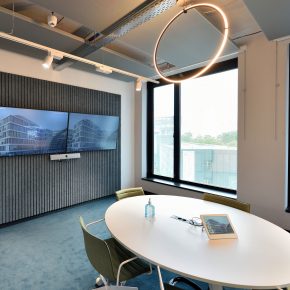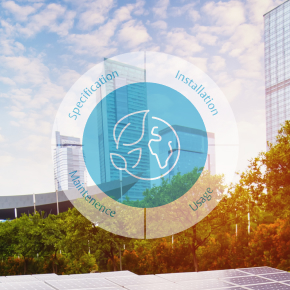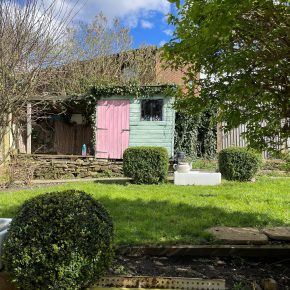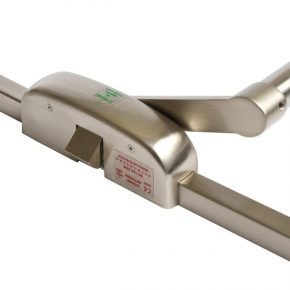
Troldtekt: Circular construction requires effort every step of the way
The construction industry cannot minimise its way out of the climate crisis. There is a need for buildings with a low carbon footprint – and for healthy, durable materials which can create value in new cycles. Troldtekt A/S has interviewed frontrunners of the circular economy for an online feature. They point to data and more respectful consumption of resources as some of the keys to more balanced construction.
‘It will take more than just efficiency enhancements and process optimisation for us to achieve our goal of sustainable building’.
This is the message from the well-known Dutch architect Thomas Rau, who established RAU Architects, and in 2013 was named Architect of the Year in the Netherlands. The transformation he is calling for fundamentally changes our role as humans on Planet Earth.
He adds: “The biggest misconception is that we think we have to build buildings. In future, buildings will be a product of a logistics process.
“In the same way, raw materials will not be raw materials either, but nature’s works of art or limited editions, and in future we will need to regard buildings as repositories of such ‘limited editions’.”

Healthy materials and the need for data
Martha Lewis, Head of Materials at leading architectural firm Henning Larsen, points to the vital importance of healthy materials and comprehensive data.
“Data increase the value of building materials in the circular economy. Information about the building materials is entered in material passports, so we know, for example, how many times an acoustic panel has been painted – and with what. The information from the material passports is transferred to a building passport that keeps track of any new materials that come into the building, and what happens to the materials which are already there,” she says, adding that the material manufacturers have an important role to play in this respect.
“It’s very valuable that a company like Troldtekt has EPDs for most of their products. In fact, it’s crucial, because in the building industry we need to know more about the climate impact from the production of building materials, and the EPDs provide this information.”
In early 2023, at the Circular Build Forum, the Danish construction industry’s new material passport was presented. The material passport declares important information about construction products – for example, have chemicals or anything else been used in production that may be of relevance when assessing whether a product can form part of a circular economy in new buildings.
EPDs ensure transparency
Troldtekt works with a range of sustainability initiatives in the production of acoustic panels – and environmental product declarations (EPDs) are a key tool here.
The environmental impact of raw materials, transport, production, use, disposal and the potential for recycling are reflected in the life cycle analysis on which the EPDs are based. Accordingly, the EPDs are a useful tool for consultants and clients when gathering and assessing documentation about building materials.
Vibeke Pedersen, Head of Engineering Department at Troldtekt A/S, comments: “Transparency and thoroughness have been keywords for us in working with our EPDs. Among other things, we have chosen to have separate EPDs for our various products rather than just working with average values.”
Cement type with reduced carbon footprint
In an interview with the cement manufacturer Aalborg Portland’s CEO Michael Lundgaard Thomsen, he looks behind the scenes at the development of the new FUTURECEM™ cement type, which has a 30% lower carbon footprint than conventional cement. Since early 2022, it has been possible to choose Troldtekt acoustic panels based on FUTURECEM – and the panels have carbon footprints that are 26% and 38% lower than those of Troldtekt based on grey and white cement, respectively, measured throughout the entire life cycle of the acoustic panels.
Visit the new online feature about sustainable building with even more information!
Latest news

19th April 2024
ASSA ABLOY: Access solutions can impact sustainability performance across the full life-cycle of a building
Embedding sustainability within any organisation requires a broad, strategic perspective. Scrutiny should include the physical infrastructure itself: According to the IEA, buildings consume around 30% of global energy*. ASSA ABLOY has more…
Posted in Access Control & Door Entry Systems, Architectural Ironmongery, Articles, Building Industry News, Building Products & Structures, Building Regulations & Accreditations, Building Services, Case Studies, Doors, Facility Management & Building Services, Information Technology, Research & Materials Testing, Retrofit & Renovation, Security and Fire Protection, Sustainability & Energy Efficiency, Video of the Week
19th April 2024
British weather doesn't dampen spirit for new HMG Garden Paint
Despite one of the wettest starts to the year on record, customers are starting to plan for brighter days with HydroPro Garden Paint from HMG Paints.
Posted in Articles, Building Industry News, Building Products & Structures, Garden, Innovations & New Products, Paints, Paints, Coatings & Finishes, Restoration & Refurbishment, Retrofit & Renovation, Site Preparation, Sustainability & Energy Efficiency, Waste Management & Recycling
18th April 2024
Abloy UK showcases new digital portfolio at The Security Event 2024
Abloy UK is set to unveil its latest line-up of access control systems at The Security Event 2024, welcoming guests to explore its cutting-edge electromechanical and digital solutions on stand 5/F50.
Posted in Access Control & Door Entry Systems, Architectural Ironmongery, Articles, Building Industry Events, Building Industry News, Building Products & Structures, Building Services, Doors, Exhibitions and Conferences, Facility Management & Building Services, Health & Safety, Information Technology, Retrofit & Renovation, Security and Fire Protection
18th April 2024
Strand is a Failsafe Choice for Emergency Exit and Panic Hardware
In times of emergency, you’re in safe hands with Strand Hardware. Although there are many considerations for building specification, few decisions can be as critical as selecting the right emergency exit/panic hardware.
Posted in Access Control & Door Entry Systems, Architectural Ironmongery, Articles, Building Industry News, Building Products & Structures, Building Services, Doors, Facility Management & Building Services, Health & Safety, Restoration & Refurbishment, Retrofit & Renovation, Security and Fire Protection
 Sign up:
Sign up: